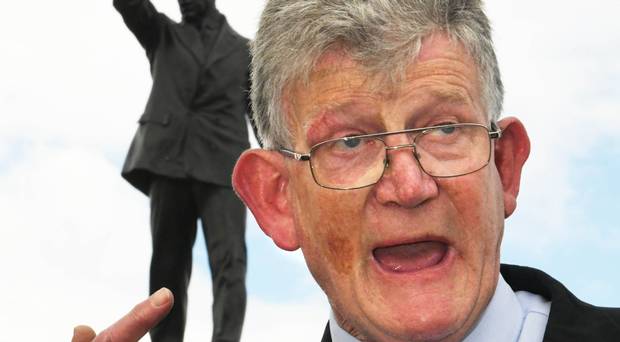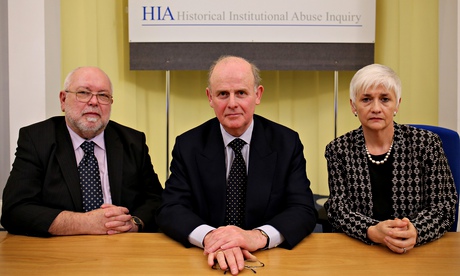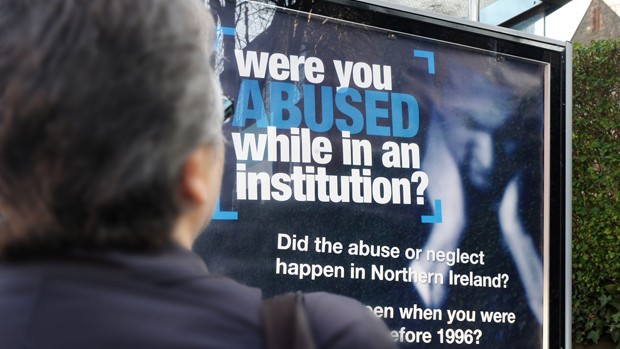
Jon McCourt of Survivors North West group
Jon McCourt has been fighting all his life, and is nearing the end of his current battle – the matter of taking on the British Government, and winning.
British MPs passed long-awaited legislation to provide compensation to victims of historical institutional abuse in November, in a last-minute decision before Parliament dissolved.
Mr McCourt and other survivors watched on in the gallery as British Secretary of State Julian Smith’s voice quivered with emotion when he described the abuse these children lived through.
“Would I do it all again? Would I walk through the fire again? Yeah I would,” Mr McCourt told the Press Association in an interview.
He admitted he is ready for the fight to end.
His fight kicked off in 1995 when he wrote an article referencing his childhood of abuse at the hands of priests in a local newspaper.
What followed was more than 20 years of fighting, co-founding campaign group Survivors North West, and pushing for an inquiry into historical allegations of child abuse.
The inquiry, chaired by Sir Anthony Hart, examined 22 residential institutions run by religious, charitable and state organisations and its remit covered a 73-year period ranging from 1995 back to the foundation of Northern Ireland and recommended compensation for survivors.
When Mr McCourt was three, his father, serving in the Air Force, was hit by a car and airlifted to a military hospital in England, sending his pregnant mother into emergency labour.
The three boys and one girl were seemingly alone in the home, and when consulted by the Air Force, a local parish priest decided they would be sent to an institution.
He found out years later that his mother’s six sisters and three brothers had not been consulted on the care of the children.
He arrived at St Joseph’s Children’s Home, Termonbacca, on the edge of Derry’s Creggan estate, when he was three-and-a-half, where he says he was given a number upon arrival, and would stay for more than a decade.
“They denied that – it’s true, they gave us numbers,” he said.
“I was number 10 the day I went down there, and my older brother was number 48, my younger brother was number 54.”
Due to his young age at his admission, he was in the home for eight years before he knew he had two brothers, and that they were in the same institution.
He found out his sister was there when another child pointed her out in the playground.
Mr McCourt’s own story, as he describes it, “runs the gamut” of mental, physical, psychological, sexual, emotional abuse and neglect, at the hands those who were charged to protect him.
“This was 10 years of abuse in all of its forms, that’s as much as I can say about it,” he adds.
When asked about hate, or whether he hates, he immediately replies: “No.”
“The reason is, it eats me up and that doesn’t serve anybody’s purpose,” he says softly.
“I’m angry at what happened. I’m angry at people who still deny the fact that it happened.
“I’m angry that it’s taken this long to resolve, what should have been resolved in 1953, when a woman from the department from the Ministry of Home Affairs went to these institutions and wrote a report that was buried.
“I’m not prepared to destroy myself because of things that other people have done wrong, and haven’t the guts to put their hands up.”
Jon starts to cry and apologises, before saying: “When you’re nine, 10, 11 years of age, and you’re being dragged from your bed into a bathroom.
“And up in front of you is a statue, or a crucifix and you say; ‘There’s God’ and there’s a quote, ‘death rather than sin’, and you’ve being dragged into a bathroom to be abused, yeah you hate.
“You hate the person who’s doing it, and you hate God – where are you in this?”
Jon is articulate, he’s calm, and it’s clear he’s well read. He says his natural love of books offered solace.
“The only release for me in there, and maybe added protection was that, if I had my head in a book, whatever was just about to happen, a lot of times went right past me, and the next person got it,” he said.
“That didn’t matter if it meant being grabbed and dragged to a room, or being beaten with a brush shaft or just being beaten up or whatever.
“Some days you’d think that’s not fair. But when you’re that age you just think, at least that’s not me.
“I think growing up and particularly through the later years after this, you start to realise if it’s not me, it’s us, it’s a lot of us.”
Mr McCourt says the number of surviving victims is shrinking – and he can recount every person in detail who lived in Termonbacca and has taken their own life, or lost it through trauma.
“I was called to Pump Street by a guy I knew, he’d seen one of the flat doors open but didn’t want to go in, and knew the man had been in the home with me,” he said.
“He was laying naked on the floor, after having drank a bottle of antifreeze.”
He adds that another “ended up in the River Foyle”.
He details lives destroyed by drink and prescription drugs and depression. He remembers walking through the Bogside when a policeman approached him telling him they had been called to a house, asking him to attend, and saying “Jon, I think it’s one of your boys”.
“The common factor in this was the trauma,” he says.

HIA inquiry panel: (left to right) David Lane, Sir Anthony Hart and Geraldine Cormack
“If this had been a factory, somebody would have said ‘is there a common cause?’
“The experience was the common cause. The inability to socialise was a common cause. The legacy of abuse and not being able to talk about dealing with it, or to be helped through was a common cause.
“Being in an institution was a common cause, the common cause is in the 10 volumes of that report,” he says pointing at the blue book, Sir Anthony Hart’s report.
When asked if he is proud of his journey towards justic, he smiles: “Of myself? No, because it was never about me.
“I’m fortunate and that I had the ability to take it on.
“I’m fortunate that the promise I made to people that I reached out to over 10 years ago, who didn’t want anything to do with this inquiry, but who were in the institutions with me, came on board, and allowed me to be part of their voice, to make this happen.
 “I’m proud of what I grew up with – children from homes took on a government and won, and had their truth.
“I’m proud of what I grew up with – children from homes took on a government and won, and had their truth.
“When I was walking out the gate of Termonbacca, I was 14 years of age, and I remember saying to my two brothers that day ‘Nobody gets to put their boot on the back of my neck, ever again’.
“That was 54 years ago last Saturday, and I’ve made sure nobody got the chance to put their boot on the back of my neck ever since.”
Tags:




